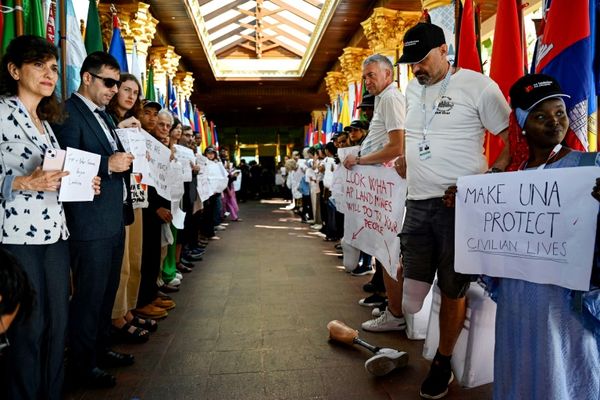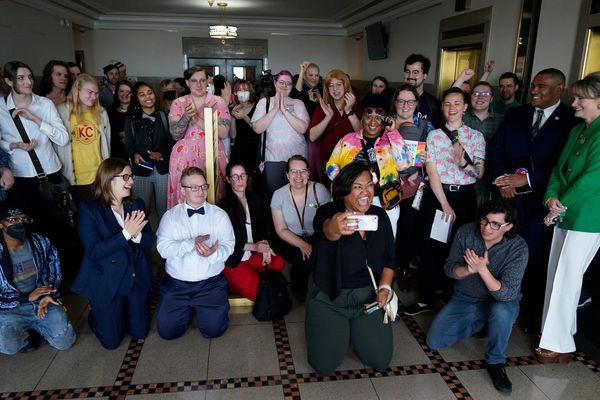
U.S. allies are concerned about the repercussions of the looming expiration of the Obama-era New START arms control treaty between the United States and Russia, according to an internal administration report obtained by Foreign Policy. Meanwhile, former officials and arms control experts worry the administration may be seeking to slow-walk the accord to death by making impossible demands of Russia just months before the treaty is slated to end.
The Trump administration faces a tight deadline to renew the 2010 New START Treaty, which slaps limits on the number of strategic launchers, such as intercontinental and submarine-launched ballistic missiles and heavy bombers that both nations can deploy. Unless both sides reach an agreement on an extension, it will end in February 2021, leaving no meaningful treaty to stave off the threat of an arms race. Top U.S. arms negotiator Marshall Billingslea appears to have temporarily set aside one condition already broadly dismissed as a nonstarter—adding China to the bilateral accord.
Still, he has insisted Beijing will have to be part of any agreement that would replace New START. “The next treaty will have to be multilateral, it will have to include China, and the framework that we are articulating together as two great powers, us and the Russians, will be the framework going forward that China will be expected to join,” Billingslea told reporters in a briefing last month.
In the meantime, U.S. officials have added other conditions: predicating a short-term extension of New START on expanded restrictions on Russia’s growing arsenal of tactical nuclear weapons.
So far, Russia hasn’t shown any inclination to go along with such preconditions for negotiating an extension of the treaty. As the clock winds down, U.S. allies in Europe and arms control experts fear New START might not be renewed.
In an internal State Department report for Congress, the Trump administration acknowledged that the United States’ closest allies are hoping to constrain Russia’s and China’s weapons programs. But the report also notes that allies are growing unnerved by the prospect of talks falling apart as Washington is distracted by a contested presidential election.
“Much has changed in the decade since New START was signed in 2010, including the development and deployment of new Chinese and Russian nuclear capabilities and the termination of the Intermediate-Range Nuclear Forces Treaty due to Russia’s longstanding violation and refusal to return to compliance,” said the report, sent to Capitol Hill in July. “Allies and partners share these concerns, although they are also concerned about the potential repercussions to the international security environment should New START expire before its full term.”
Though Billingslea has tried to push the Russians to accept more weapons inspections, there is concern among experts that the United States would also lose vital intelligence into Russian nuclear modernization if the deal lapses.
Given China’s rapid military modernization and its new place as America’s major strategic rival, the Trump administration sought to rope China into what was originally a bilateral accord. China dismissed repeated efforts by Trump administration officials to begin discussions on the matter—including Billingslea posting a photo of empty seats with Chinese flags placed in front of them during negotiations with Russia that drew scorn from both Russian and Chinese officials.
Eventually, even U.S. President Donald Trump backed away from the insistence on including China in the renegotiated New START treaty by this summer, and Billingslea appeared to drop any such demands in his meeting with Russian counterparts in Vienna last month. That initial insistence helped cause long delays in the treaty’s renewal, which has worried many U.S. allies.
“Publicly, they will lament [stalled negotiations] heavily because their domestic politics demand it. But they also recognize that, in the long term, China’s absence from any meaningful nuclear arms control is a concern,” said one U.S. official.
But even publicly, U.S. allies have said they’d like to see the deal renewed sooner rather than later, even if that means dealing with China at a later date.
“In the absence of any agreement which includes China, I think the right thing will be to extend the existing New START agreement to provide the necessary time to find agreement—U.S., Russia, but hopefully also with China,” NATO Secretary-General Jens Stoltenberg said at a think tank forum in June. “We cannot risk losing the New START agreement without having something else … to replace [it],” he added. Last year’s demise (over Russian violations) of the Reagan-era Intermediate-Range Nuclear Forces (INF) Treaty raised concerns in Europe.
But after three years of shifting objectives, maximalist demands, and minimal interagency cooperation, some in Washington are beginning to wonder if the administration is actually trying to save the deal after all.
Several House aides who spoke to Foreign Policy on condition of anonymity said that they had gotten minimal information on the Trump administration’s negotiating framework, and they worried the United States could still be positioning for an exit from the deal, given little coordinated interagency activity on forging a new agreement over the past three years. They point to newly provided reports to Congress that raise questions about whether New START remains in U.S. interests—a seemingly politically charged departure from past findings—by pointing to Russian violations of other arms control treaties. Billingslea, for his part, has suggested that the United States could reinstall launchers on ballistic missile submarines that were taken out of service to comply with the 2010 deal.
But while Trump has overseen the U.S. exit from plenty of international agreements—the Iran nuclear deal, the INF Treaty, and the Open Skies Treaty—and previously called New START “another bad deal,” it’s not clear he would bless the demise of New START now. Many attribute the dropping of the demand to include China to the president himself.
“The leash more or less got yanked in July when Trump said he wants to pursue a deal with Russia first,” said Pranay Vaddi, a former State Department arms control official and now a fellow at the Carnegie Endowment for International Peace, referring to a White House press conference earlier this summer when Trump called for the pursuit of talks with Russia instead of a trilateral deal.
But then came fresh demands—and increasingly tough negotiating ploys from the U.S. team.
“I suspect that after President Trump wins reelection, if Russia has not taken up our offer, that the price of admission, as we would say in the U.S., goes up,” Billingslea told the Russian newspaper Kommersant in an interview on Monday.
Some critics see the new U.S. demands, such as for more U.S. inspections of Russian nuclear weapons and the expansion to cover tactical nuclear weapons, as moving the goal posts too close to the deadline.
“This is an eleventh-hour offer at best here after three years of this administration being in office,” said Kingston Reif, the director for disarmament and threat reduction policy at the Arms Control Association. “This is coming extremely late in the game, all of which raises the ever-growing concern that this is about running out the clock.”
One concern is that, even if Trump himself is ready to dial back his initial demands and aim for a more limited renewal of the existing treaty with Russia, not everybody is on board.
“[Billingslea]’s trying to seize failure from the grip of victory because he ultimately doesn’t like arms control, but he probably has a boss who does,” Vaddi said.






